Justice DY Chandrachud Judgment
- Hello Friends, Let’s see the Justice DY Chandrachud Judgment.
- Introduction –
Justice Dr. Dhanahjaya Yeshwnt Chandrachud was born on 11-11-1959 to former chief of India, Justice Y.V. Chandrachud. He practiced law at the Bombay High Court and the Supreme Court of India.
- Justicial Journey –
On 29th March 2000, Justice Chandrachud was appointed as an Additional judge of the Bombay High Court.
- Nitish V. Union of India, 2021 –
In this case, the Supreme Court was concerned with the validity of the requirements that had been put in place by the army to decide upon the grant of a permanent commission to women short-service Commission officers. The Court hence, directed that such requirements shall not be enforced.
- Mahendra K.C. V. State of Karnataka, 2021 –
In a case, the Single Judge of Karnataka High Court had termed a person committing suicide an ‘ Eraking’ and also observations on how the behavior of the deceased before committing suicide was not that of a person who is depressed and suffering from mental health issues. The bench of Dr. d.Y Chandrachus and B.v. Nagrathna held that such observations describing how a depressed person ought to have behaved deeply diminishes the gravity id mental health issues. The mental health of a person cannot be compressed into a one-size fits all approach.” This judgment is famously known as ” Privacy judgment’. justice Chandrachid was part of the 9 Judgment Bench which unanimously held the right to privacy is a basic fundamental right. The Bench observed that the Right to Privacy forms an intrinsic Art.
- 21 and freedoms guaranteed in part 3.
The 3 -judge bench of Dr. Chandrachud, Indu Malhotra, and Indira Banerjee Summarised the principles relating to the conduct of a Test Identification Parade and held that. The identification in the course of a TIP is intended to lend assurance to the identity of the accused.
In this landmark 5 – judge Bench decision which became instrumental in upholding the rights of the LGBT community, It was held that Section 377 IPC is unconstitutional insofar as it criminalized gay sex between consenting adults. In his concurring opinion, Dr. D.Y. Chandrachud ” It is difficult to right the wrongs of history. but we can certainly set the course for the Future.” Held that lesbians, gays, and bisexuals have a constitutional right to equal citizenship in all its manifestations.
- Joseph Shine V. Union of India, (2019) 3 SCC 39 –
The 5 – Judge Constitution Bench held Section 497 IPC and Section 198 (2) CRC to be unconstitutional and violative of Articles 14,15, and 21 of the constitution. Dr. Chandrachud observed that.
- Common Cause V. Union of India,(2018) –
The 5-judge Constitution Bench of SC held that the right to die with dignity is a fundamental right as held in Gian Kaur V. State of Punjab, Both Voluntary and involuntary are permissible in his concurring opinion.
- Jahan V. Asokan K.M 920180 16 SCC 368 –
The 3-judge bench termed the instant case to be a perfect example of ” patriarchal autocracy and possibly self-obsession with the feeling that a female is a chattel”. SC set aside the verdict of the Kerala high court wherein it had annulled the marriage between two consenting adults, namely, Hadiya and Shafin Jahan.
- Indian Young lawyers association v state of Kerala –
The Supreme Court in the case of Indian Young Lawyers Association V. Union of India consisting of the five-judge bench of A.M. Khanwilkar, violation of their right to equality and right to freedom of religion.
- Romilla Thapar vs Union of India, sc 2018 –
In the instant case, wherein 5 human rights activists were charged and arrested under the provisions of unlawful activities and the 3-judge bench of the court with a ratio of 2:1 rejected their prayer seeking appointment of SIT and court-monitored investigation. Justice Chandrachud dissented with the majority. He observed that ” Dissent is a symbol of a vibrant democracy. Voices in opposition cannot be muzzled by persecuting those who take popular causes ” taking the view that a special investigating team should be appointed to pursue that matter stated.
